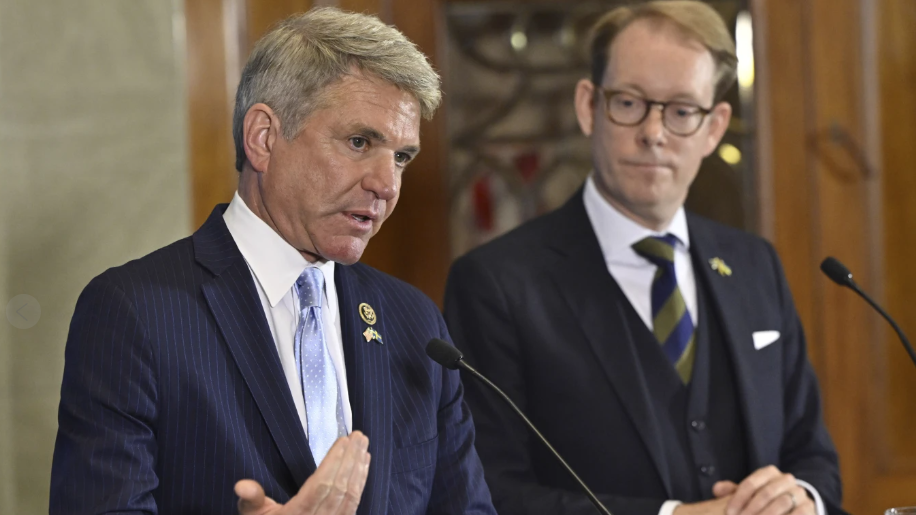US House Foreign Affairs Committee chair calls Russia-China alliance the biggest threat since WWII

STOCKHOLM (AP) — The chairman of the U.S. House Foreign Affairs Committee said Friday that a partnership between the Russian and Chinese leaders worried him, adding, “We have never seen a threat this large scale to Europe and the Pacific, I would argue, since World War II.”
An alliance between Chinese leader Xi Jinping and Russian President Vladimir Putin “provides a very big challenge I think for the free world in this great power competition that we find ourselves in,” Rep. Michael McCaul, a Texas Republican, said during a visit to Sweden.
The Biden administration has warned Xi’s government of unspecified consequences if it supports the Kremlin’s war effort in Ukraine. A United States intelligence report said Beijing possibly provided equipment used in Ukraine that might have military applications. The report cited Russian customs data that showed Chinese state-owned military contractors supplied navigation equipment, fighter jet parts, drones and other goods, but didn’t say whether that might trigger U.S. retaliation.
China has stepped up purchases of Russian oil and gas, which helps Putin’s government offset lost sales after the United States, Europe and Japan cut off most purchases of Russian energy. Beijing can do that without triggering Western sanctions on its own companies, but Washington and its allies are frustrated that it undercuts economic pressure on Moscow.
China rejects Western trade and financial sanctions on Russia because they weren’t authorized by the United Nations Security Council, where Beijing and Moscow have veto power. However, China has appeared to avoid directly defying those sanctions.
McCaul, who was part of a U.S. congressional delegation visiting Sweden and met with Foreign Minister Tobias Billström, said he expects the Nordic country to join NATO by October.
Long-neutral Sweden applied for NATO membership together with neighboring Finland in 2022. New entries must be approved by all existing members, and as NATO leaders met for a summit in Vilnius, Lithuania, Sweden was missing the green light from two: Turkey and Hungary.
Finland, which shares a 1,340-kilometer (832-mile) border with Russia — more than doubling the length of NATO’s border with Russia — became the 31st member of the world’s biggest military alliance in April. But it wasn’t until a NATO summit in July that Turkey’s president agreed to send the accession documents to the Turkish Parliament for approval, something he had refused to do for more than a year.
By having Finland and Sweden in NATO, “I think it will achieve the exact opposite effect that Mr. Putin wanted to achieve, and that was to weaken and divide NATO,” McCaul said. With the two Nordic neighbors in NATO, the alliance has “never been stronger and more united,” he said.
The visiting congressional delegation also included Gregory Meeks, D-N.Y.; Ann Wagner, R-Mo.; Gerry Connolly, D-Va.; Madeleine Dean, D-Pa.; Thomas Kean, R-N.J.; and Bill Huizenga, R-Mich. After Stockholm they were to travel to the Netherlands for meetings with Dutch government officials and members of parliament, among others.
The delegation’s Europe visit aims to bolster ties with U.S. strategic allies, as well as discuss support for NATO and Ukraine, ways to hold Russia accountable for its actions in Ukraine; and how to confront shared threats from China. The Netherlands and Denmark recently said they will donate fighter jets to Ukraine.
